During a snappy
roundtable with a few journalists, actors Viggo Mortensen and Jason
Isaacs double-teamed to express their thoughts about their
disturbing new film, Good, based on the acclaimed British
play by CP Taylor. Set during the Nazi era like several other
movies this season this feature describes a relatively banal man's
acceptance into pre-war Nazi society of the 1930s. As he rises in
status, we see how the seductive power of fascism can compromise
someone slowly until they are in so deep it's too late to repudiate
it.
German literature
professor John Halder has written a novel advocating compassionate
euthanasia. When the book is unexpectedly read by Hitler and his key
advisers, Halder is enlisted to make an argument for managed
euthanasia which is ultimately used as a rationale for the Final
Solution. The meek professor suddenly has a new career as an
honorary S.S. officer.
With Halder's
change in fortune, his seemingly inconsequential life is imbued with
an allure and power he hadn't experienced before, leading him to
leave his wife for a beautiful, status-hungry grad student (Jodie
Whittaker) and ultimately betray his Jewish friend, the charismatic
Jewish psychiatrist Maurice (Jason Isaacs), who ends up in a
concentration camp.
There's no better
actor than Mortensen to express this transformation from an
apolitical professor living within his world of words to someone who
enjoys the prestige and power of the Nazis initially, only to be
appalled at the consequences of his tacit support of their methods.
Ever since he made his mark with A Walk On The Moon,
Mortensen has wrestled with some complicated characters in two David
Cronenberg films (A History of Violence and Eastern
Promises), Appaloosa and played the heroic and enduring
Aragorn in the Lord of the Rings trilogy.
As a foil to
Mortensen's character, Veteran British actor Isaacs (he's in the
Harry Potter series) provided his character Maurice with the
trajectory of a man once on top of his world declining precipitously
as he is destroyed by the pernicious system around him. Both bonded
through Vicente Amorim's sympathetic direction (who popped in at the
end of the interview and is picture here with Viggo and Jason).
This movie has
two distinct character arcs that intersect. The challenge, to get
those things in sync as if they're happening simultaneously is
tough; can you explain the dynamic of getting those rhythms right?
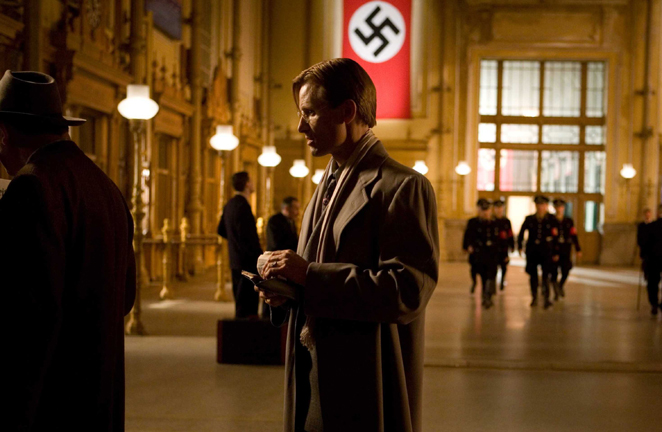 Viggo
Mortensen:
It's true. We do cross and take on different roles as Halder builds
up this new persona for himself. He was always the one who was like
"Let's go have a beer," then all of a sudden the roles change. They
don't exactly swap, but they're different.
Viggo
Mortensen:
It's true. We do cross and take on different roles as Halder builds
up this new persona for himself. He was always the one who was like
"Let's go have a beer," then all of a sudden the roles change. They
don't exactly swap, but they're different.
Jason Isaacs:
The power dynamic shifts enormously. For me that was one of the
great and interesting things about this story that it wasn't about
governments or armies or Nazi generals. It was about two ordinary
guys who are best friends, and a friendship that I recognize:
someone who's much larger than life, someone with a great big hunger
a womanizer, a drinker, just kind of an eater of life who has
this friend with a rather dull marriage who basks in his shadow.
Then these
outside circumstances so change their lives that in many ways the
power dynamic is reversed. Playing Maurice as he gradually deflates
was, I thought, very interesting and a very human journey, to see
someone stripped of all their dignity like that.
Conversely, Viggo,
you play this character whose ego is built up, and then given
responsibilities that he doesn't want to shoulder as a result. But
then you do shoulder them and you feel regret. There's this
back-and-forth process that you have to get right.
Viggo Mortensen:
Well, some people have said to me, "This is a very passive role
compared to others you've played recently." My answer is: it's
active in a different way. He's passive to a point, but then he
starts building up this persona and buying into it. He's in a lot of
denial. Then he's actively accepting and even pursuing this new
sexual life, being part of some sort of subsection of the elite of
the country he lives, and he's liking a lot of it.
Whether he's
being completely honest with himself a lot of the time or not, he's
accepting it and saying, "Yes, I like it, I'm doing it. And in fact,
I think I won't go see Maurice tonight for a beer because I don't
want to deal with him looking at me and having to think about it."
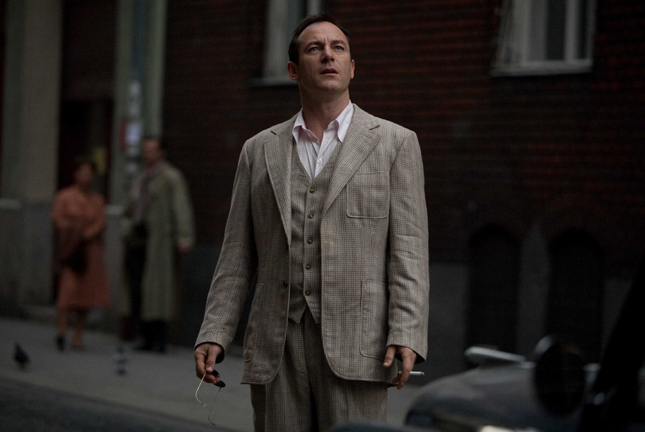 Jason
Isaacs:
You think he believes that argument that you made to me, that if
more good decent people like us joined the [Nazi] party we can
dissolve the lunatic fringe?
Jason
Isaacs:
You think he believes that argument that you made to me, that if
more good decent people like us joined the [Nazi] party we can
dissolve the lunatic fringe?
Viggo Mortensen:
I think he's told himself that. He believes it, but he's forcing
himself to believe that. If we were to stop and think everything
we're doing wrong, then these personalities we construct and we
all do it to varying degrees are dependent on who we meet, what
the circumstances are, and what the climate is. We present ourselves
in slightly different ways [according to the circumstances].
My character has
really gone to great lengths to create this [persona] who no longer
stutters, who looks people in the eye, who is a person of importance
now. He knows he doesn't belong there, what the fuck is he doing
there? Excuse my language...
He knows if he
were to go and have a drink with Maurice now like the scene when
they sit on the bench and are talking it [would be] difficult.
Jason Isaacs:
It's like when I was saw Bono and [Bob] Geldof talking about working
with [George] Bush in Africa. They said, "You know, he is in power
and he does have the money and I can make him do good."
Viggo Mortensen:
I can see the argument. I think that's the strength of the movie.
You can look at this person and see he's intelligent and thoughtful.
When [the Nazi professor says to Halder] "We don't teach Proust,"
he's sarcastic about it.
For the record,
[my character is] saying "I don't like it." But he goes along with
it. He wants to keep his job, so he goes along with it: "Yeah,
fine." I think people identify and understand the idea of if you're
in the system; you can make changes to it. But if you're out of it,
it's easy to sit on the sidelines.
Each person knows
themselves. How far have I gone? Have I arrived at the point where I
know I'm really doing the wrong thing? You really know that
yourself, if you force yourself or are forced to examine it. To some
degree, that's what this story is about.
Jason Isaacs:
For me, it wasn't about whether he was doing the wrong thing. It
was, "How would you do the right thing?" In the last eight years,
we've been saying we don't agree with torture. But have we done
anything about it? Are you ultimately powerless, [so] you get on
with your life and the people who love you, and your work? I
personally found it very hard to point the finger [at anyone in this
movie].
Viggo Mortensen:
The fact that there are no easy answers doesn't mean you don't do
something, even if it's going to fail.
Jason Isaacs:
That's the message you get at the end of the story. There was a
line: it's the easiest thing to do, to say there is no line. You're
powerless and there's nothing you can do, other than vote once every
four years. But there must be some action you can take, no matter
how hard and complicated it is to find.
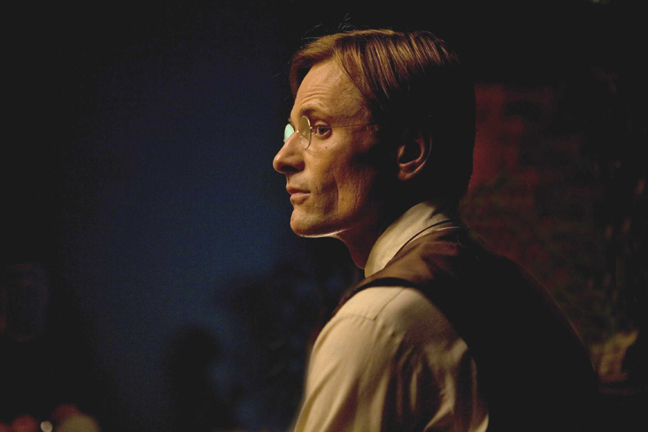 We
know from the outside the real apocalyptic legacy of the Nazis, but
they're on the inside, so they don't know it.
We
know from the outside the real apocalyptic legacy of the Nazis, but
they're on the inside, so they don't know it.
Viggo Mortensen:
Well, that's the strength of this movie. It doesn't work from
hindsight, like almost all movies on the subject, good and bad, and
books about the period. There's this scene when the character Anne
says [the swastika] makes people happy, so it can't be bad.
You see these
kids running along with swastikas made out of flowers. In fact,
there was this kid during the break on the first day of shooting,
this little Hungarian kid about five years old, playing with the
little swastika flag. [He was] sticking it in the sand castle,
really having fun with it. There's a still they took of that; it's
really quite disturbing, but he's having a fun time. What people
forget is that in the 1930s that was simply the flag of Germany. It
didn't have all these Holocaust connections [it has today].
When the Olympic
[athletes] competed in the 1936 Olympic Games in Berlin, they
competed under that flag. It was simply the flag of the party, and
the swastika was a symbol that had come from other places India,
the Navajo. It was a universal symbol meaning different things in
different places. If you raise your hand in a certain way in
Austria, you'll go to jail, but that's now. This movie [tells it] as
if you're there.
Jason Isaacs:
I didn't think it was about the apocalyptic circumstances that came
about. In 1933 this was an amazing country. [It was] coming into
full bloom, kids had clubs to go to. But a small part of the
community were having their civil rights eroded, but not in such a
way that it took away from all the other wonderful things going on
unless you were Jewish. In which case, it wasn't so great. But you
weren't hard up [initially]. The Jews were benefiting from many
other things happening magnificently in the country [at the time].
Because I've done interviews where I've been asked, "Is the message
of the film that, if we don't watch out, all this could happen
again?"
It's not about
where we got to in 1943. 1933 was bad enough if you were Maurice.
1937 wasn't such a great year for him. Frankly there are people
around the planet today who, as a consequence of me buying these
clothes made in China, don't have a very good day at work. There are
homeless people I've stepped over to get into the hotel today. It's
about this ethical minefield we experience every day. It's not about
whether it would or wouldn't come to a genocidal apocalypse again.
It's about how do you live your life in the very challenging times.
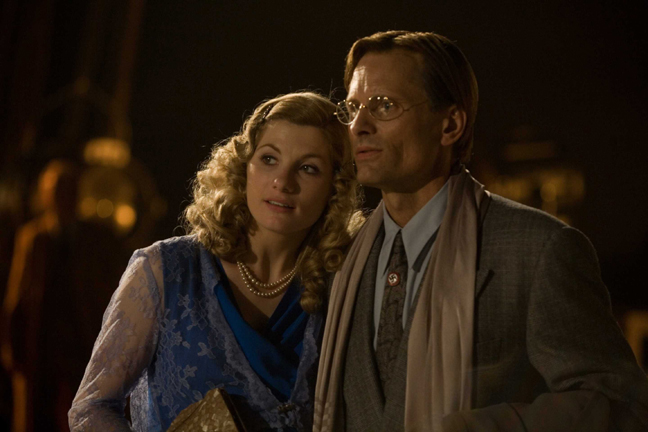 It's
easy enough to condemn the distant past. But the Iraq war movies
have all been box office failures because that's what is all around
you. It's a different thing.
It's
easy enough to condemn the distant past. But the Iraq war movies
have all been box office failures because that's what is all around
you. It's a different thing.
Jason Isaacs:
I think when Arthur Miller wanted to talk about McCarthyism this
cancer that was eating American society he wrote a play about the
Salem witch trials called The Crucible. I think, in these
very challenging and terrifying times we live in, which are full of
fear and rationalization, there are a million decisions that I make
every day that I'm not sure about. I have small children. I have no
idea how they will or won't judge me for the things I do.
Viggo Mortensen:
Sometimes, a good way that I looked at this story metaphorically,
was the notion that when you have a pot of water, if it's boiling
water and you throw a frog in, it will jump out. But if you bring it
up slowly, the frog will just get warmer and warmer [until it's too
late] and then he cooks.
Jason Isaacs:
Wow, that's really cruel, have you done that?
Viggo Mortensen:
No. But that's a metaphor for the German people. Why didn't they do
something? Why didn't you leave if you were Jewish? They didn't
realize what was going on, how warm it was getting. It wasn't
boiling at once, it took a while.
Did you know each
other before shooting?
Viggo Mortensen:
No. I knew Jason's work, and I flew out to Providence where Jason
was filming [Brotherhood] to meet him, as I knew we wouldn't
have time before filming started.
Jason Isaacs:
It was a generous gesture of Viggo to do that. I don't want to get
too soppy, but it made me feel incredibly warm towards him. When I
arrived in Hungary, having had to shed a character on the plane,
Viggo had already been around Europe on his own research trip and
gathered some artifacts he thought might be useful for the character
of Maurice.
Viggo made it
very, very easy for me to like him. He made it very easy to be his
friend on screen and off screen. We have a relationship and these
things count. You're relaxed in each other's company; you tell each
other when you're being an idiot. That usually takes months and
months on a film set, and we had about 20 minutes [to do so].
Viggo Mortensen:
Also. there's a simple idea of, "Do you like to rehearse and talk
about stuff?" Of course, we both do [so that was] great.
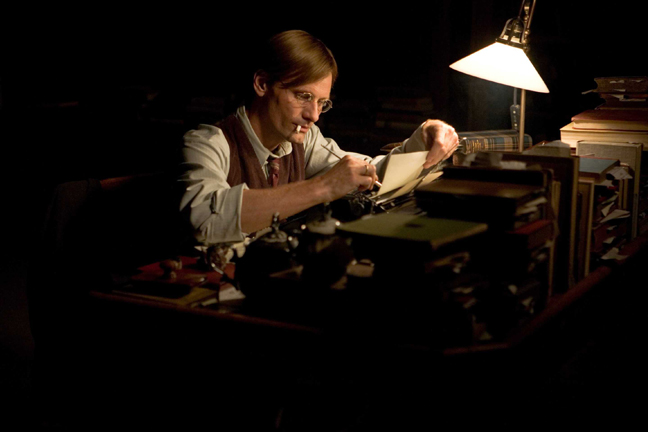 This
film seems to welcome a degree of improvisation.
This
film seems to welcome a degree of improvisation.
Jason Isaacs:
We improvised a bit. You look someone in the eye and try and figure
out how a human would behave in 1935.
Did you need to
do research, and what kind did you do? Obviously you've read these
books, but were there films you watched as well, like the Nazi
propaganda films that Goebbels commissioned?
Viggo Mortensen:
This is different in that it doesn't have a big moment at the end.
You're not let off the hook as an audience, with a catharsis. You
can't say, "Oh, what a horrible villainous person who deserved to
die," or "How great, he went down in a hail of bullets but he did
save four-and-a-half people. This film is different. It's not over
when it's over, which is the mark of a good story. [In Istvαn
Szabσ's film] Mephisto, which was also shot in Budapest, is a
character who bears some resemblance, but he's ambitious from the
get-go and he's monstrous.
The thing about
Halder is that he's quite normal. The strength of the film is this
normalcy. It's quite mundane even in the camp it's just another
day in the camp. The sun happens to be shining; there's a couple of
dead guys, there's a guy who looks like he's going to die pretty
soon, and there's someone's going to get some crappy soup; some are
lined up and are going to get gassed. It sounds terrible, but it's
actually just another day.
One of the things
I did, apart from going to Germany and listening to music and all
that, was that I drove around in Poland where camps had been. Some
places were hard to find. It was a hot day, I was by myself. I
finally sat down, and I'm thinking about all these sign posts I've
seen. I gradually realized I am here and the sun is shining and the
birds are singing and it was a beautiful spring day and you know
they saw those days, too. Whether they were dying or ill, or guards,
or maintenance men cleaning the officer's porch, or preparing the
soup, there were nice days.
There weren't
always what we see in these movies grim, black and white, dramatic
events every second. You walk down the camp and it's disturbingly
quiet and normal. It's become acceptable. For the Jews in the camp,
yesterday, today, tomorrow, this is what I'm dealing with now it's
not dramatic in a sense. And that's what's disturbing.
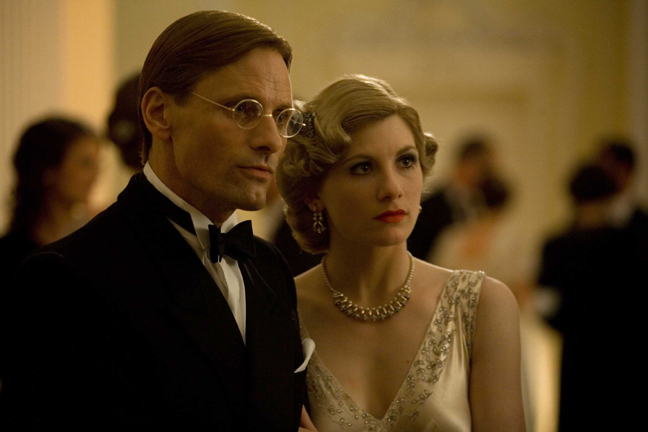 Even
when we were shooting that scene at the end, the strangest thing was
the quiet. We hear this music playing as I approach with the camera
following me, and it [gets] louder and louder, but there wasn't much
else. So people say, "It doesn't seem like concentration camp." No,
it doesn't seem like a concentration camp in movies. But it's a
place, and there are people there, and it's just another day.
Unfortunately.
Even
when we were shooting that scene at the end, the strangest thing was
the quiet. We hear this music playing as I approach with the camera
following me, and it [gets] louder and louder, but there wasn't much
else. So people say, "It doesn't seem like concentration camp." No,
it doesn't seem like a concentration camp in movies. But it's a
place, and there are people there, and it's just another day.
Unfortunately.
I'm not saying I
wasn't disturbed by it. It was even more disturbing. I brought
things and covered them in dirt and placed them around... But it was
more disturbing than fires and rain and screaming.
Jason Isaacs:
The first day I had off, I went to the Museum of Terror, which was a
state police museum. In the very first room there was a panel that
deal with the fact that half a million Jews were killed in the first
month there. I did an open-top bus tour, and the guide was saying
that 90% of the population is Catholic and about 2% other, mainly
Jewish. I asked, what was that percentage before the war? And she
said, "I don't know, I think maybe the same." Everywhere I went, I
wondered who lived there. I wondered who was dragged out screaming.
Viggo, your next
film is based on Cormac McCarthy's
The Road, and it deals with some equally difficult situations in
the near-future.
Viggo Mortensen:
And there are lots of great Germans in it! It's no surprise that
that book is [McCarthy's] best-selling book, because it's very
direct, and very universal. Everybody is the child of someone. Many
people have children; everybody has some idea of the parent-child
relationship. Any parent who's halfway interested in their child has
that concern: "Well, if I'm not here for a week, or a day, or
forever, will my kid be all right? Who's going to watch, who's going
to feed them?" Children will also worry. That's taken to an extreme
Any parent's worry is taken to an extreme like, if I'm gone, this
kid has nothing and probably will be killed and eaten [laughs]!
CLICK HERE TO SEE WHAT VIGGO MORTENSEN HAD
TO SAY TO US IN 2007!
CLICK HERE TO SEE WHAT
VIGGO MORTENSEN HAD TO SAY TO US IN 2017!